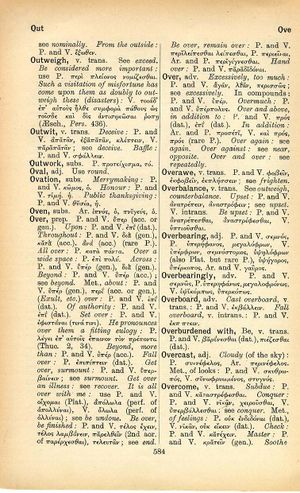overcome: Difference between revisions
οὐ μακαριεῖς τὸν γέροντα, καθ' ὅσον γηράσκων τελευτᾷ, ἀλλ' εἰ τοῖς ἀγαθοῖς συμπεπλήρωται· ἕνεκα γὰρ χρόνου πάντες ἐσμὲν ἄωροι → do not count happy the old man who dies in old age, unless he is full of goods; in fact we are all unripe in regards to time
(Woodhouse 4) |
(CSV4) |
||
| Line 1: | Line 1: | ||
{{ | {{Woodhouse1 | ||
| | |Text=[[File:woodhouse_584.jpg|thumb|link={{filepath:woodhouse_584.jpg}}]]'''v. trans.''' | ||
<b class="b2">Subdue</b>: P. and V. καταστρέφεσθαι. | |||
<b class="b2">Conquer</b>: P. and V. νικᾶν, χειροῦσθαι, V. ὑπερβάλλεσθαι:see [[conquer]]. | |||
Met., <b class="b2">of feelings</b>: P. οὐκ ἐνδιδόναι (dat.). V. νικᾶν, οὐκ εἴκειν (dat.). | |||
<b class="b2">Check</b>: P. and V. κατέχειν. | |||
<b class="b2">Master</b>: P. and V. κρατεῖν (gen.). | |||
<b class="b2">Soothe charm</b>: P. and V. κηλεῖν. | |||
<b class="b2">Surmount</b>: P. and V. ἐκδύεσθαι (gen.). V. ἀντλεῖν, διαντλεῖν, ἐξαντλεῖν. | |||
<b class="b2">Be overcome, grow faint</b>: P. and V. κάμνειν (rare P.). προκάμνειν (rare P.), παρίεσθαι, P. ἀποκάμνειν. | |||
<b class="b2">Be unmanned</b>: see under [[unman]]. | |||
<b class="b2">Be overcome</b> (<b class="b2">by feelings, etc.</b>): P. and V. ἡσσᾶσθαι (gen.). V. νικᾶσθαι (gen.), Ar. and V. δαμασθῆναι (dat.) (2nd aor. pass. δαμάζειν), V. δαμῆναι (dat.) (2nd aor. pass. δαμάζειν). | |||
}} | }} | ||
Revision as of 09:48, 21 July 2017
English > Greek (Woodhouse)
v. trans.
Subdue: P. and V. καταστρέφεσθαι. Conquer: P. and V. νικᾶν, χειροῦσθαι, V. ὑπερβάλλεσθαι:see conquer. Met., of feelings: P. οὐκ ἐνδιδόναι (dat.). V. νικᾶν, οὐκ εἴκειν (dat.). Check: P. and V. κατέχειν. Master: P. and V. κρατεῖν (gen.). Soothe charm: P. and V. κηλεῖν. Surmount: P. and V. ἐκδύεσθαι (gen.). V. ἀντλεῖν, διαντλεῖν, ἐξαντλεῖν. Be overcome, grow faint: P. and V. κάμνειν (rare P.). προκάμνειν (rare P.), παρίεσθαι, P. ἀποκάμνειν. Be unmanned: see under unman. Be overcome (by feelings, etc.): P. and V. ἡσσᾶσθαι (gen.). V. νικᾶσθαι (gen.), Ar. and V. δαμασθῆναι (dat.) (2nd aor. pass. δαμάζειν), V. δαμῆναι (dat.) (2nd aor. pass. δαμάζειν).

